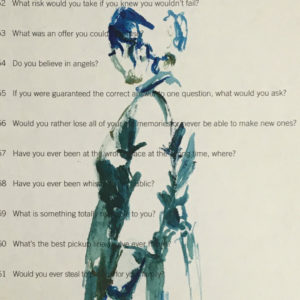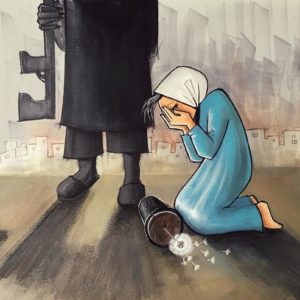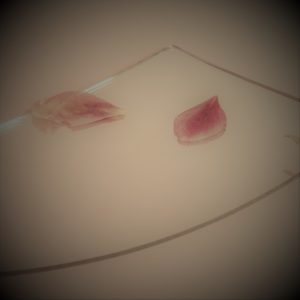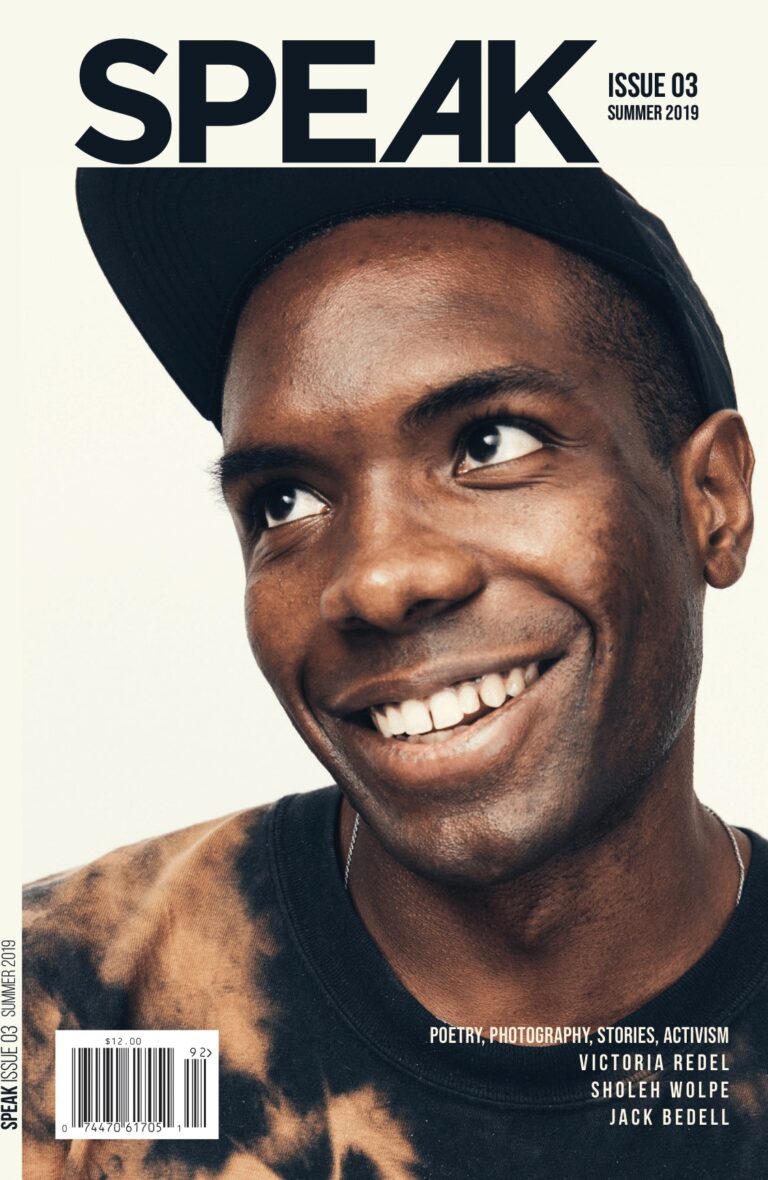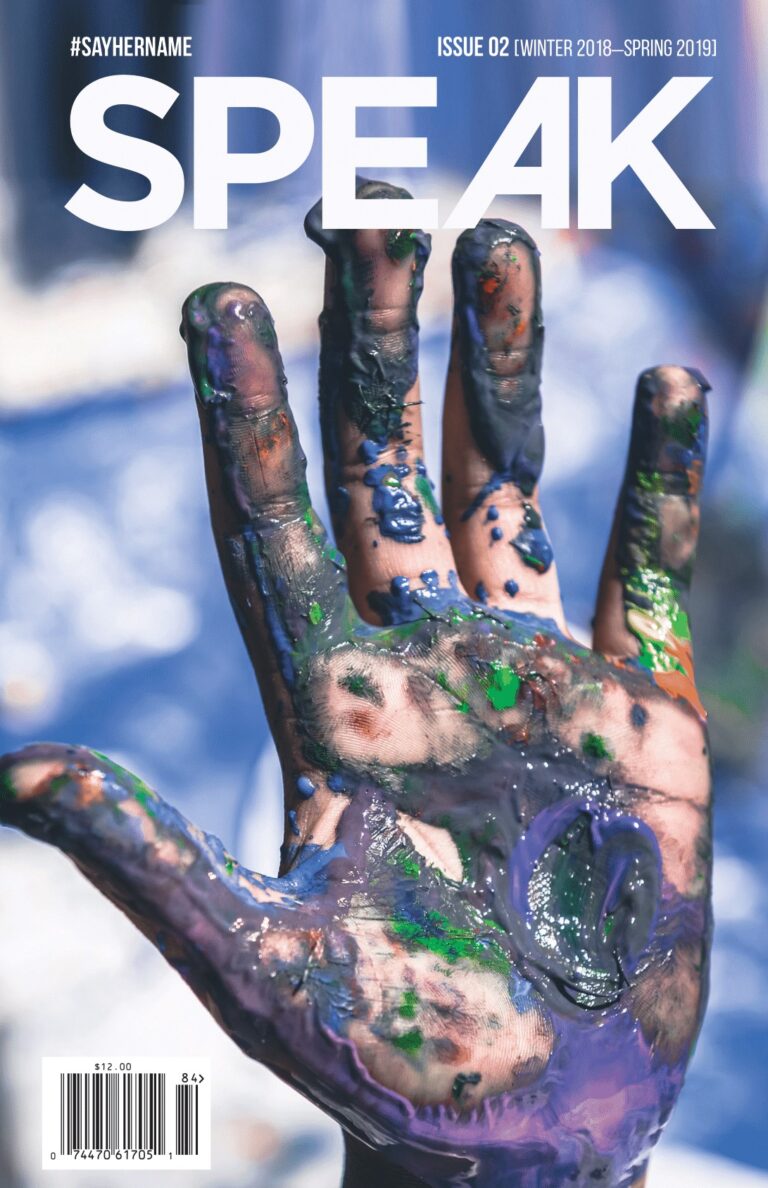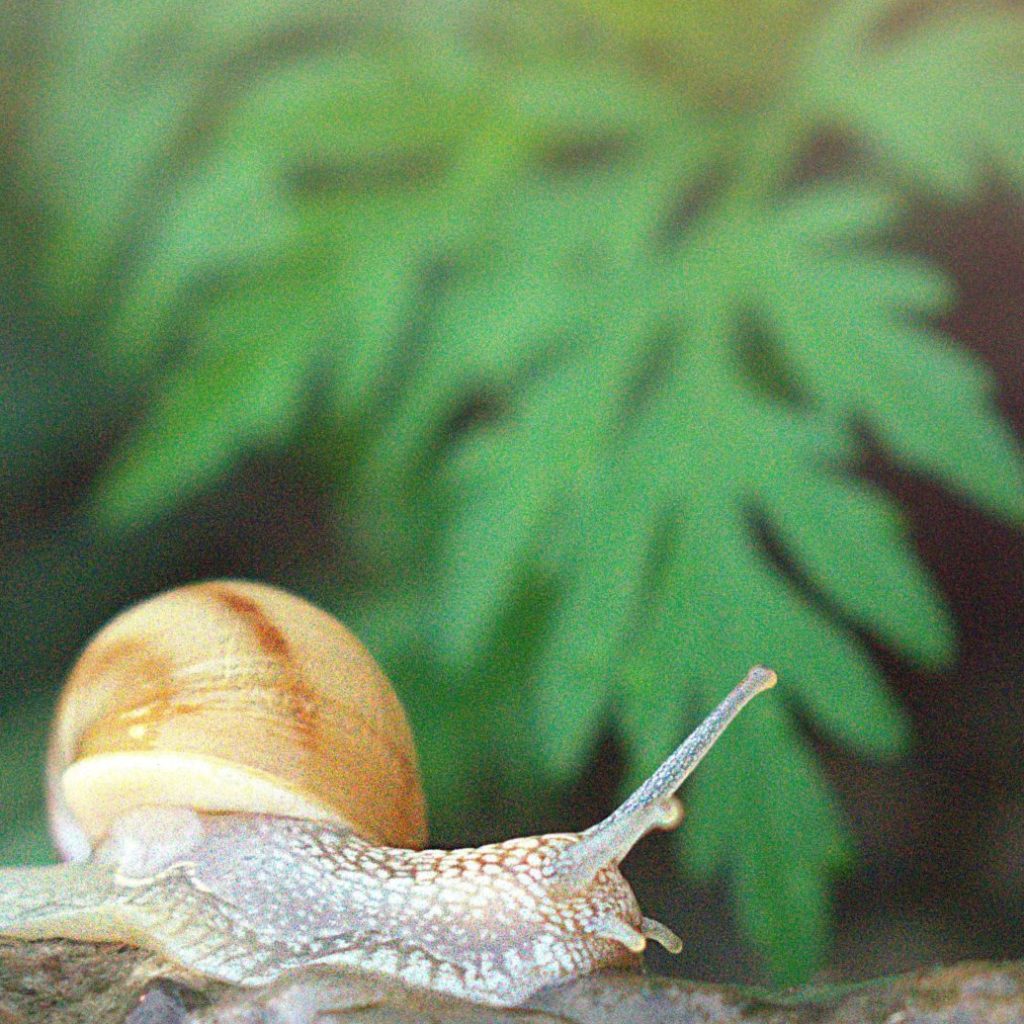
Zareh Vorpuni (1902-1980) is an Armenian author who emigrated to France in the early 20th century. Fluent in French and holding a deep admiration for realist authors like Balzac and Proust, Vorpuni strove to incorporate French literary styles into his exclusively Armenian fiction. His characters are often impoverished immigrants alone amidst a crowd, and his ornate prose contains narratives that jump between different viewpoints and times. This story first appeared in his 1946 collection Room for Rent.
- GT
The Snail
by Zareh Vorpuni, translated from Western Armenian by Garen Torikian
“Look at the snail, how slow it is!”—Royal Readers
The snail’s the one to blame in this story—yeah, that “harmless” slimy creature that we all know. It’s a fighter, one that always moves so slowly across grassy fields and up along the walls, leaving behind a white ribbon that measures the strength of its endurance. Every young boy plays the same game with snails, pleading with them to appear with their cries of “Come out, come out, wherever you are.” Every snail is perpetually frightened, with its head squeezed into its shell. But if it’s bewitched by a child’s seductive charms, little by little, it stretches its neck out, revealing ears that protrude from its head. We delighted in trying to trick the snail. Did we actually convince it to come out, or did it obey us in an attempt at self-preservation?
Either way, I still often recall the horrible crunch of a snail smushed underneath my heel. And I remember, too, those intoxicating sunsets during the last days of summer, spreading a pink and purple subtlety across everything.
About four years ago, I was involved in a situation that changed my life—although I only realized this about a year ago. Ever since then, the memory of that day has resurfaced, time and time again, like electrical shocks zapping my brain. Although the day-to-day drudgery does, eventually, smother out many such recollections, this one stubbornly resists being forgotten. It pinches my nerves and twists them, rendering me completely immobile. Whenever someone starts saying a word that starts with an “s,” or if I happen to come across the word “snail” while reading, I imagine that docile creature slowly dragging itself across the fields of Honfleur[1] towards a linden tree. And Marie’s there too, crouching over the snail, her stance wide enough to give it room to pass through.
Tonight, locked up in my room, I am once again victim to my nightmare. I’m sitting at my table with my palms supporting my chin. I bear witness to a never-ending procession of apparitions swirling around me. They smile and dance, and their antics torment me. I’m alone and helpless, and the terror is overwhelming. My room becomes Honfleur. Snails slide slowly. I watch them, follow them, and I tremble because they’re not going anywhere—certainly not at their churlish pace. My eyes bulge wide and nearly come out of their sockets. I grasp about for the light switch, determined to call for help in the darkness.
It’s very late. My rusty eyes crack open like venomous flowers; all I see are snails, and they’re crawling, creeping…they never go away. Whenever I close my eyes and shut them tight, the snails turn into André, a two-year-old screaming toddler who has just learned to walk. He runs after the snails without a care in the world.
Just this evening, I was obligated to accept a friend’s invitation to meet for dinner. We sat across from each other at the table and discussed our orders while flipping through the menu.
“Let’s start with a dozen snails, shall we? Do you like to eat snails? It’s the specialty of this restaurant. They make it in the Alsatian style….”
There’s no doubt that if my friend knew what I’ve told you, he wouldn’t have suggested that dish. It was bad enough that the menu had a picture of a snail in the corner, but my dear friend felt it necessary to boast about the delicacy to me, with a smile so wide it nearly tore his cheeks apart.
“…especially because they cook it the way they do in Alsace, which I prefer over the way they make it in Burgundy.”
The waiter brought us twelve snails in a dimpled aluminum tray. The restaurant around me blacked out of view as if a curtain had been drawn around me. I was no longer aware of my friend, but his muffled voice reached me from behind the fabric. He was blathering on.
“Anyway, in Alsace, they drink young wine with their snails. But I prefer beer—Alsatian beer, strong and thick. Young wine is too sweet to have with a spicy meal like snails. And anyway, young wine looks like mud. This here’s Gruber, the most well-known beer from Alsace. Nearly every city in France serves it. Walsheim is pretty good, too. It’s kinda surprising, actually, that neither of them is very popular in Alsace! How are they? Do you like the snails?”
The snails crawl around on my plate. As I hover over them with my spoon and small fork in hand, it feels as if I’m about to eat André. When I put one into my mouth, I’m unable to swallow it. I try to wash it all down with some beer. I imagine André’s body on my plate, cut up into pieces. With each chew, I hear muffled screams ringing in my ears. My friend, with his nose buried in his plate, continues bragging, his eyes shining. Wrapped up in his own self-centered thoughts, he tries to engage me in a pithy conversation.
“What, you’re already drunk? For me, it’s one sip per snail, even though they make me so thirsty.”
“But…I…Kevork, buddy, I’m gonna …this is André’s…”
I don’t know what happened after that. The next thing I remember is the waiter’s blank expression. He was dabbing the vomit off my shirt and offered me a glass of ice-cold water.
At this moment, the night is heavy with silence. It’s peaceful outside. Sometimes, the room fills with the bellow of horns coming from the harbor; and from the station, the sharp scream of a train whistle pierces the tranquility.
Last year, I was sent to Le Havre for work. I ended up with a whole afternoon to myself. I thought that the city was utterly devoid of any charm. The massive cafés, the wide streets, the beachfront—all of it bored me. I was on my way to Sainte-Adresse when all of a sudden, I had the idea to go to Honfleur. Places become valuable to us because of the memories we make there. From that perspective, Le Havre offered me nothing, not even a friendly handshake. I can revisit the special places in my life whenever I want by riffling through my memories: Rouen, for example, or Notre-Dame de la Garde[2], Tour Jeanne d'Arc, Bon-Secours[3], or the view from the banks of the Seine. Usually, there’s a beautiful woman accompanying me from place to place.
The sea along the shore was calm. The ship I had come in on was docked right alongside the port. A strange type of mania began to bubble inside me, an impatient need to get up and go. It was as if someone were waiting for me on the other side of the water, in Honfleur. I knew that it was the same sun shining all over the world, but when I set off on my journey, I swear that it became just a little bit brighter.
* * *
It was the end of summer. The hillside I stood on was green, and the air was saturated with the scent of linden trees. With September approaching, all of nature was in full bloom. Below, lying just above the horizon, the sun looked like a plump orange. There was no sight or trace of any snails. I wanted to play with one, pulling its white ribbon along. Everything was quiet and still. There was a girl nearby, sitting on the grass, reading a book, completely absorbed in it; judging by the solemn way she looked, she treated the act as a religious ritual. Once in a while, a car would come streaking down the road, kicking up a cloud of dust. I had never felt more content.
Just as the sun spread its final streaks across the evening sky, the impulses that had brought me to Honfleur were dissipating. I was feeling pretty drowsy when all of a sudden, the cries of a wailing child sliced through my serene calm. The screams were pleas for help from someone who had just realized that they were alone. I ran towards the sound and came upon a woman behind a small, dilapidated church. She was crouching beneath some bushes and holding a bouquet of wildflowers in her left hand. We kept our distance from each other. The woman clenched the flowers tighter against her chest. It’s a strange feeling, wanting to run away and being unable to. It’s as if some force compelled us to remain perfectly still.
Fear, it turns out, is the best nourishment for one’s imagination. Whirling around the chalice of time, the past overflows and drowns out the present. Beneath some trees, standing in the shade of the ancient church wall, we were playing a childish game. A light wind blew, cooling our trembling foreheads. The sun stripped off its colorful veils all over the horizon like a hurried lover and sunk lower into its green bed, pulling a starry blue blanket over itself. Carefully, the sky placed its dark hands over our weary eyes.
A snail appeared from the grass. One of the sun’s final rays struck its ears like the flame of a match approaching a candle. Slowly, slowly, it pushed itself towards the trees.
The scene reminded me of another moment. Marie crouching over a snail while I’m lying on my stomach. From the way she’s standing, her short dress reveals her calves, smooth and white, round and wide, like marble columns. Another yelp from the boy threatened the gentle memory we shared. I tried to block out the noise and concentrate: a snail, crossing the grass, its gaze fixed on Marie looming overhead. It’s moving towards the tree, closer to victory with each laborious slide, its existence literally oozing out of it. The snail takes its time as if it’s deliberating on which route to take. Marie’s blue veins glow through her snow-white skin. She bends down a little lower, and her dress hikes a little higher. Her thighs come closer to me. My hands begin to tremble.
I kept my eyes half-closed in to keep this scene vivid. The snail began to climb up the side of the tree, a little bit faster now, as the head of the boy appeared, then his neck, his shoulders, his arms, torso, legs. He cried out: “Mama!”
The memory came at me all at once.
The air was cool. This woman across from me has the exact same stance Marie once took. The boy approached his mother and looked over at me. It hadn’t taken long for the ghosts of my past to make me realize what I had done. I decided then and there to stay in Honfleur forever. Of course, it wasn’t the peaceful seaside village or its transcendent sunset which would keep me; it wasn’t even that the daily ritual of the fishermen going out in their boats was pure poetry, equipped as they were with good intentions. I wanted to stay because my heart was bound tightly in chains. It was impossible for me to see this woman as anyone other than someone I had once loved with such a fierce passion.
The snail advanced slowly. The woman repositioned herself to stand over the white ribbon it left behind. She bent a little lower to examine the creature more closely. She pulled her dress up a bit and took a wider stance. Blue veins marked her snow-white skin. My forehead was warm, and the cool, evening wind comforted me. It’s impossible to envision an alliance between snails and women, but it’s easy to understand the intent behind a woman’s movements, not to mention her audacity. I will never forget that the snail was complicit in all of this. I wanted to rage against its revenge, even if it meant luring it out of its shell just to fulfill the promise made in my childhood for it to come out, come out, wherever it is. The snail’s body is an illusion; even if we could witness the miracle of it leaving its shell, it would only be for an instant.
Marie clutched the flowers against her chest, and thanks to the ring she wore, I was able to recognize the truth. My longing gave way to courage, and I spoke to her.
“Marie, I’m here now. I’m so sorry…”
She scoffed.
“But, Marie… this boy needs his father!”
“What father? He doesn’t have one,” she replied. “He’s only got me. What use is a man? He makes a mess out of everything and then runs away.”
“Things happen for a reason,” I pleaded. “Don’t they?”
Marie didn’t want to talk. With a single swoop, she took the boy’s hand. She turned her back to me and headed down the road towards the city. I stood there, stunned.
The world is vast and wild. It’s swallowing me whole, slowly, at a snail’s pace. The image of a mother and her son walking hand-in-hand presses up against my skull. Marie didn’t want to answer my question, but I understood her response. My misdeeds made her a better mother.
[1] A port city in northwestern France.
[2] A basilica in Marseilles, also known as Bonne Mère ("Good Mother").
[3] A neighborhood in Marseille.
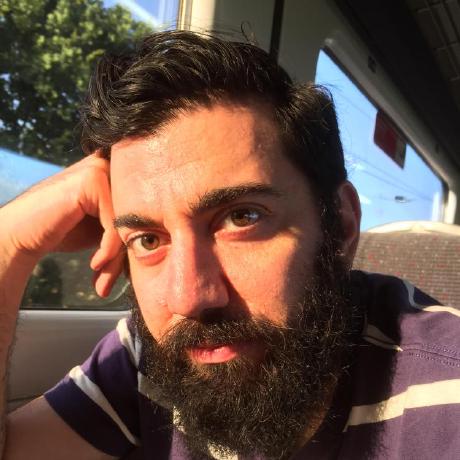
meet the author
Garen Torikian
Garen Torikian is a fiction writer, essayist, and translator from Western Armenian into English. A recent graduate of the Master's in Literary Translation program at the University of East Anglia, he's currently an MFA candidate in fiction at Columbia University. [...]
Read More
Subscribe to our newsletter

